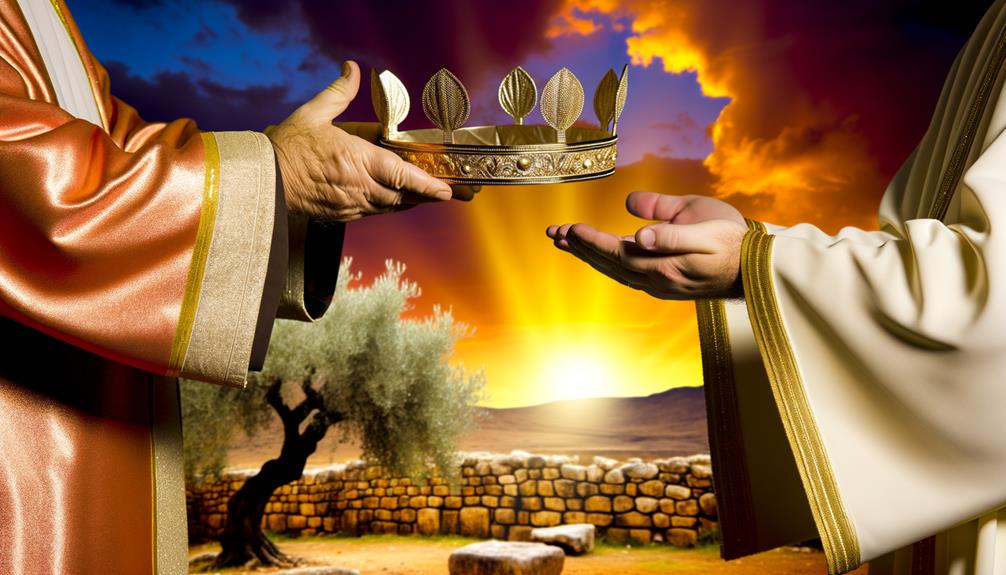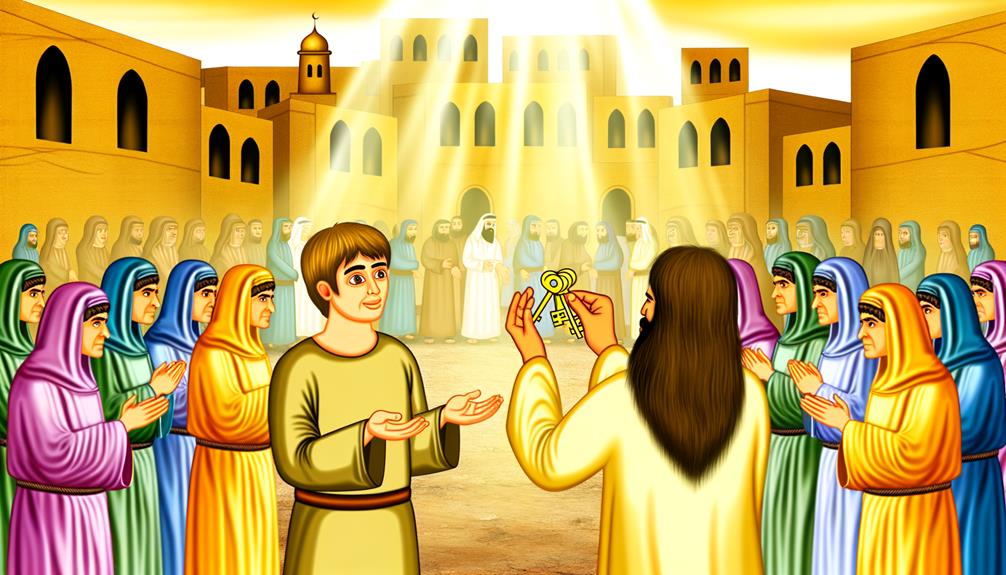Changing of the Guard Meaning in the Bible: Leadership
In the Bible, the concept of ‘changing of the guard‘ signifies divinely orchestrated leadership shifts to maintain the continuity of God’s covenant and guidance. Examples include Moses handing over to Joshua, Elijah to Elisha, and Saul to David, all highlighting the seamless transfer of divine authority and responsibility.
These shifts often emphasize God’s unwavering presence and the imperative of covenantal faithfulness, while adapting to new challenges and contexts. Such narratives underscore the theological conviction that God’s purpose transcends individual leaders, ensuring His will is perpetuated through successive generations.
Exploring these shifts reveals deeper insights into divine governance and spiritual continuity.

Changing of the Guard Meaning in the Bible: Divine Transition and Appointed Shifts
| Aspect | Details |
|---|---|
| Definition | A symbolic phrase indicating a transition of authority or responsibility |
| Key Bible Reference | Transition from Moses to Joshua (Deuteronomy 34:9) |
| Symbolic Meaning | Leadership change, divine appointment, new seasons, spiritual succession |
| Spiritual Insight | God orchestrates leadership changes to fulfill His greater purpose |
| Moral Lesson | Be prepared and faithful, as God may call you to step into new roles |
Moses to Joshua

The shift of leadership from Moses to Joshua, as depicted in the Bible, exemplifies a divinely orchestrated change in governance that underscores the continuity of God’s covenant with Israel.
This alteration, detailed in the Book of Deuteronomy and the opening chapters of Joshua, highlights a seamless handover of divine authority.
Moses, the lawgiver and liberator, prepares Joshua by imparting wisdom and divine mandate, ensuring Israel’s guidance remains unbroken.
Theologically, this shift signifies God’s unwavering presence and promise to His people.
Contextually, Joshua’s military acumen and fidelity to Mosaic law symbolize a pragmatic evolution in leadership, tailored for the conquest of Canaan.
This narrative underscores the importance of faithfulness and divine sanction in leadership succession.
Elijah to Elisha

Similarly underscoring the significance of divinely guided leadership, the change from Elijah to Elisha in the Bible encapsulates a profound moment of prophetic succession and divine empowerment.
This transition highlights the seamless continuity of God’s mission through chosen vessels, preserving the prophetic voice amidst changing circumstances. Elijah’s dramatic ascension to heaven in a whirlwind (2 Kings 2:11) and Elisha’s reception of a double portion of Elijah’s spirit (2 Kings 2:9) underscore this divine orchestration.
- Symbolic Mantle Passing: Elijah’s cloak symbolizes the transfer of prophetic authority.
- Miraculous Continuity: Elisha’s miracles affirm the enduring presence of divine power.
This narrative enriches our understanding of leadership within a theological framework.
Saul to David

The transformation from Saul to David exemplifies the profound theological implications of disobedience and divine election in the biblical narrative.
Saul’s failure to adhere to God’s commandments led to his rejection, paving the way for David’s anointing by Samuel as the chosen king.
This shift underscores God’s sovereign plan and the importance of faithful obedience in leadership.
Saul’s Disobedience Consequences
Saul’s disobedience to God’s commands led to his rejection as king, paving the way for David’s anointed rise to leadership in Israel.
Saul’s failure to utterly destroy the Amalekites (1 Samuel 15:9) and his unlawful sacrifice (1 Samuel 13:13-14) demonstrated his inability to fully submit to divine authority. This disobedience resulted in:
- Divine rejection: God regretted making Saul king and declared his kingdom would not endure.
- Loss of spiritual guidance: The Spirit of the Lord departed from Saul, and an evil spirit tormented him.
These events illustrate the theological principle that obedience to God is paramount for sustained leadership.
David’s Anointing by Samuel
In the wake of Saul’s rejection, the prophet Samuel was divinely instructed to anoint David, marking a pivotal change in Israel’s leadership from flawed human monarchy to divinely sanctioned kingship. This anointing, found in 1 Samuel 16, symbolizes God’s sovereignty in choosing leaders who align with divine will, contrasting Saul’s disobedience.
Theologically, David’s selection underscores the importance of inner virtue over external appearances, as God looks at the heart (1 Samuel 16:7). Contextually, this alteration highlights a move towards a covenantal kingship where the ruler is expected to embody and uphold God’s statutes.
Samuel’s act of anointing David consequently signifies a divine endorsement and a new era in Israel’s history, setting the stage for David’s future reign.
Transition and God’s Plan
Central to the narrative of Israel’s leadership shift from Saul to David is the theological premise that God’s sovereign plan unfolds through divinely orchestrated events.
The shift exemplifies how God intervenes in human history to fulfill His purposes, often in unexpected ways. This change underscores several key themes:
- Divine Selection: Despite Saul’s initial favor, David is chosen by God, highlighting divine prerogative over human preference.
- Moral Integrity: David’s rise reflects a shift towards a leadership that values obedience and righteousness.
This transformation therefore serves as a pivotal example of how divine sovereignty shapes historical and spiritual trajectories.
Samuel to Saul

The change from Samuel to Saul marks a significant divine appointment shift in Israel’s history, where the theocratic leadership of the prophet gives way to the monarchical reign of the king.
This change not only alters the prophetic role, as Samuel moves from being the primary leader to a supportive prophetic figure, but also signifies a pivotal change in the anointing of leadership, with Saul being chosen as the first earthly king of Israel.
The theological implications of this shift underscore the evolving dynamics of God’s relationship with His people and the establishment of a new governance structure.
Divine Appointment Shift
Examining the change from Samuel to Saul reveals a profound shift in divine appointment and governance within the biblical narrative.
This alteration marks Israel’s move from a theocratic system, led by judges and prophets, to a monarchical regime under a human king. Theologically, this shift reflects God’s accommodation of Israel’s desire for a king to lead them, despite their initial rejection of divine rule.
Key aspects of this alteration include:
- Divine Displeasure: God’s reluctance in appointing Saul indicates divine disapproval of Israel’s request.
- Human Leadership: Saul’s kingship symbolizes human intervention in a previously divine governance structure.
This analysis provides a deeper understanding of divine sovereignty and human agency in biblical history.
Prophetic Role Transition
Samuel’s prophetic role did not diminish with Saul’s anointment but rather evolved to encompass new dimensions of guidance and oversight.
Theologically, Samuel’s continued involvement signified God’s unwavering presence and authority amid Israel’s monarchical transformation.
Contextually, Samuel’s duties shifted from direct leadership to a more advisory capacity, ensuring Saul’s adherence to divine commands. This transformation highlights the prophetic office’s flexibility in adapting to Israel’s evolving governance structures.
Analytically, it underscores the enduring nature of prophetic authority, even as political power shifted to the newly anointed king. Samuel’s role as a mediator between God and the monarchy emphasized the necessity of spiritual oversight in leadership, ensuring that the divine covenant remained paramount in Israel’s national identity.
Leadership Anointing Change
In the change from Samuel’s prophetic leadership to Saul’s anointed kingship, the shift signified a pivotal moment in Israel’s governance that underscored the theological continuity and contextual dynamism of divine authority. This alteration marked the nation’s move from a theocratic judge-led system to a monarchy, reflecting the Israelites’ desire to be like other nations.
Key elements of this transformation include:
- Divine Selection: Saul was chosen by God, illustrating divine sovereignty in leadership selection.
- Prophetic Anointing: Samuel anointed Saul, symbolizing the prophetic endorsement and divine approval.
This change elucidates the interplay between divine will and human agency in biblical leadership.
Aaron to Eleazar

The shift of the priesthood from Aaron to Eleazar represents a significant moment in biblical history, symbolizing continuity and divine order within the Israelite religious framework.
Aaron, the first High Priest, served as a central religious figure during Israel’s formative years. His son, Eleazar, succeeded him in a ceremonious transfer described in Numbers 20:25-28, where Aaron’s garments were placed upon Eleazar.
This act not only guaranteed an unbroken priestly lineage but also underscored God’s immutable plan and the importance of covenantal faithfulness.
Theologically, this change illustrates the perpetuation of divine mandates through ordained leadership, reinforcing the structured and divinely sanctioned governance within Israel.
Such changes were essential for maintaining religious integrity and communal stability.
Jesus and the Disciples

Just as the priestly succession from Aaron to Eleazar marked a significant shift in religious leadership, the calling of Jesus’ disciples signified a transformative moment in the establishment of a new covenantal community.
Jesus’ choice of twelve ordinary men, from various walks of life, underscored a radical redefinition of spiritual authority and communal identity. This act echoed Old Scriptures paradigms while forging a distinct path forward.
- Inclusivity: Jesus’ selection transcended socio-economic boundaries, inviting a diverse group into God’s mission.
- Empowerment: The disciples were entrusted with spiritual authority, symbolizing a democratization of religious power.
This strategic ‘changing of the guard’ redefined the fabric of faith.
Paul and Timothy

Paul’s mentorship of Timothy exemplifies a deliberate and strategic passing of spiritual and doctrinal responsibilities, embodying the essence of continuity and renewal within the early Christian church.
Analyzing their relationship reveals Paul’s intentionality in nurturing Timothy’s leadership, as seen in the pastoral epistles. Paul’s letters to Timothy highlight essential teachings and guidelines for church governance, reflecting a framework for sustaining ecclesiastical integrity. Moreover, Paul’s mentorship emphasizes the qualities of a leader, urging Timothy to embody both spiritual maturity and moral integrity. Such guidance is crucial in fostering a community that adheres to sound doctrine and biblical principles, particularly in a context where the role of the head of the household defined is paramount to the church’s mission. By establishing these foundations, Paul ensures that Timothy is well-equipped to address challenges and lead with wisdom.
This mentorship underscores the apostolic emphasis on doctrinal purity and effective ministry. Contextually, Timothy’s role as Paul’s protégé is significant; he serves as a bridge between the apostolic generation and emerging church leaders.
Theologically, this relationship illustrates the necessity of preparing subsequent leaders to maintain and propagate the gospel message with fidelity and zeal.
Peter and the Early Church

Emerging as a central figure in the nascent Christian movement, Peter’s leadership in the early church is pivotal for understanding the establishment and expansion of early Christian doctrine and community practices. His role encompassed:
- Doctrinal Foundation: Peter was instrumental in articulating core Christian doctrines, as evidenced by his speeches in Acts.
- Community Leadership: He facilitated the formation of a cohesive community, emphasizing unity and shared beliefs.
Analyzing Peter’s contributions provides insights into the theological and organizational development of early Christianity. His influence underscores the dynamics of leadership change and the evolution of doctrinal and communal structures in the young church.
Conclusion
The biblical motif of ‘changing of the guard‘ signifies pivotal changes in leadership, embodying God’s continued guidance and presence.
From Moses to Joshua and Elijah to Elisha, these shifts symbolize divine endorsement and the perpetuation of God’s covenant.
The narrative arcs of Saul to David and Samuel to Saul illustrate the divine criterion for leadership.
Furthermore, Jesus’ disciples and Paul with Timothy highlight mentorship’s spiritual significance.
As torchbearers of faith, these figures demonstrate that divine purpose transcends individual lifespans, ensuring continuity in the divine mission.






